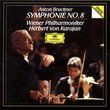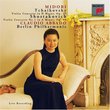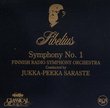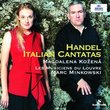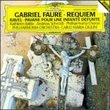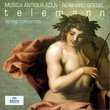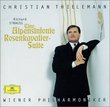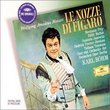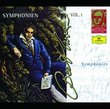| All Artists: Guillaume Bouzignac, William Christie, Les Arts Florissants, Paul-Alexandre Dubois, Armand Gavrilidès, Anne Mopin, Paul Agnew, Nathan Berg, Stephan Van Dyck, Steve Dugardin, François Bazola, Aymeric Dorange, Christoph Davezac, Jeremie Poirier-Quinot, Arthur Le Mesre De Pas Title: Bouzignac: Te Deum; Motets Members Wishing: 0 Total Copies: 0 Label: Harmonia Mundi Fr. Original Release Date: 1/1/2006 Re-Release Date: 7/11/2006 Album Type: Import Genres: Pop, Classical Styles: Vocal Pop, Opera & Classical Vocal, Chamber Music, Historical Periods, Classical (c.1770-1830) Number of Discs: 1 SwapaCD Credits: 1 UPC: 794881801824 |
Search - Guillaume Bouzignac, William Christie, Les Arts Florissants :: Bouzignac: Te Deum; Motets
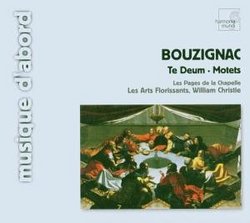 | Guillaume Bouzignac, William Christie, Les Arts Florissants Bouzignac: Te Deum; Motets Genres: Pop, Classical
|
Larger Image |
CD DetailsSimilarly Requested CDs |
CD ReviewsThe Ultimate Musical Eccentric? Giordano Bruno | Wherever I am, I am. | 09/02/2008 (5 out of 5 stars) "Guillaume Bouzignac (1690?-1743?) was not attached to the French Royal Court. His music was not published by Ballard, who held a royal monopoly on musical publication. He MAY have been a choirboy in Narbonne, a master of the choirboys in Grenoble, a musical servant of Henri Montmorency, governor of Languedoc at the time of the wars against the Huguenots, and a person of musical importance in the city of Tours, where the manuscript of these motets was discovered in 1905. That covers almost everything that's known about the composer outside of the very specific information about his musical thought contained in his works. The American musicologist James Anthony wrote in 1974: "There is a degree of individuality in his music altogether remarkable in a period of general conformity within a prescribed genre. Simply stated, there is no other music of the time that looks the same on the page or sounds the same as the motets of Bouzignac." Honestly, I'd go a little farther. It seems to me that Bouzignac took the musical vocabulary of the 17th Century - Schuetz, for instance - and composed an alternate future aesthetic all of his own, uninfluenced by his Italian and French contemporaries, which lay dormant until the end of the 20th Century. I don't mean that Bouzignac has suddenly become influential; far from it, he's hardly less obscure than he was 300 years ago. Rather, I think I could take several of his motets and palm them off on a contemporary audience as the work of a modern composer, one who was steeped in the aesthetics of Early Music but who chose to incorporate elements of the Protestant choirbook and the "Negro spiritual." The works described as "dialogue motets" in the program notes could just as easily be considered "call and response." The "lack of homogeneity" and the "text fragmentation" discussed in those program notes sound to me extremely prophetic of the directions taken by 20th C composers of choral music. In effect, I'm hearing Bouzignac as a composer so far outside his own era in style that by serendipity he speaks eloquently to our modern sensibilities. Whether you buy my notions or not, this is an exciting and unique CD. William Christie, the most insightful of French Baroque advocates, has combined his own Les Arts Florissantes ensemble with the viola da gamba ensemble Orlando Gibbons and the choir Les Pages de la Chapelle for this recording, in which the choir is predominant but the soloists essential at expressive moments. The gamba pieces sound quite squarely in the tradition of gamba quintets dating back to the English gentry composers of the 17th C, but the choral music is wildly different from baroque genres - highly dramatic, pictorial, not at all symmetrical or repetitive. If you have any lurking prejudices to the effect that all baroque music sounds the same, Bouzignac will jostle your taste. The performance? Of course there are no competitors with which to compare it, so we'll just have to assume that Bill Christie isn't pulling our legs, that the musical notation on the manuscript pages justifies the rambunctiously eccentric sounds his conducting elicits from his singers. Les Arts Florissants is easily the foremost ensemble in the field of French baroque music, and this recording is well up to their usual standards. What a fun CD!" Review (from Gramophone) Slobberer | Astoria, NY United States | 12/23/2008 (5 out of 5 stars) "Guillaume Bouzignac French c.1592-c.1641
Bouzignac: Ecce festivitas amoris. Ecce homo. Unus ex vobis. In pace in idipsum. Ha, plange, filia Jerusalem. Vulnerasti cor meum. Alleluya, Venite amici. Flos in floris tempore. 0 more, ero mors tua. Clamant clavi. Ecce aurora. Dum silentium. Jubilate Deo. Salve Jesus piissime. Ave Maria. Tota pulchra es. Te Deum. Les Pages de la Chapelle; Orlando Gibbons Viol Ensemble; Les Arts Florissants Chorus and Instrumental Ensemble / William Christie. Harmonia Mundi © HMC 901471 (63 minutes: DDD: 6/94). Recorded 1993. If, by any chance, you should think that with another disc of French seventeenth-century church music from Les Arts Florissants you know what to expect, think again. Bouzignac is quite definitely, quite splendidly, different. Try Unus ex vobis on your friends and see if they can tell what century it comes from, let alone what country (its lugubrious dialogue between Christ and his disciples actually sounds more like something from the Russian Orthodox Church). This is music that abandons itself to its text in as absolute and direct a way as you are ever likely to encounter in the baroque period, and the results are sometimes gripping, sometimes haunting, and sometimes both. But that is not all. Bouzignac knew his counterpoint; he could write in joyous, celebratory vein, rather like a lightfooted Gabrieli (Jubilate Deo}', and there is also music of aching beauty -- In pace in idipsum should be enough to melt anyone into their chair. Christie marries an acute sense of drama to a sensitivity to words and to the music's lyrical qualities. He uses boy sopranos, and though their singing is hardly in the polished Arts Florissants mould, it does square nicely with this music's straightforward mode of communication. " |

 Track Listings (16) - Disc #1
Track Listings (16) - Disc #1